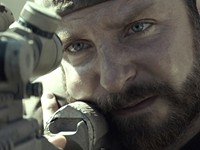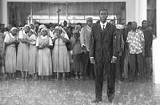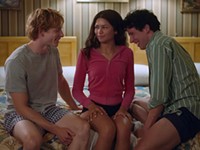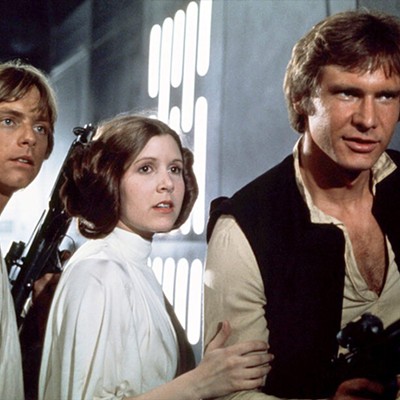[
{
"name": "500x250 Ad",
"insertPoint": "5",
"component": "15667920",
"parentWrapperClass": "",
"requiredCountToDisplay": "1"
}
]
A decade ago, the news trickled in, accompanied by images of unparalleled savagery, of massacres in a country few people in the West had ever heard of, on a continent few cared about, and involving class, tribal, and ethnic tensions almost nobody comprehended.
In the midst of one of those messy and complicated civil wars in Rwanda, a landlocked former Belgian colony, an ethnic group called the Hutus declared war on their fellow citizens, the historic ruling minority, the Tutsis. The conflict resulted in the single most horrifying example of genocide --- though no one dared to call it that --- since the Holocaust, the brutal slaughter of almost a million Rwandans.
The highly praised Hotel Rwanda concentrates on some of the horrific events of that period through the documented heroism of a Rwandan named Paul Rusesabagina (Don Cheadle), who managed a four-star hotel, where he housed and ultimately saved some 1200 of his fellow citizens from the butchery of the Hutu extremists.
A Hutu himself, Paul vowed to protect his family and friends, many of them Tutsis, from the dual threat of the military dictatorship and the paramilitary militia. As a kind of lesson to Americans, that militia was whipped into frenzy by the incessant attacks of an African version of our right-wing hate radio.
Aside from the story of Paul's actions in the midst of utter chaos and in the face of extraordinary dangers, Hotel Rwanda also demonstrates the shameful failure of any country or organization to aid the victims of the civil war. Neighboring African nations, the former colonial powers of Europe, the United States, and the United Nations all turned their backs on the horror.
The UN, in fact, reduced its meager, lightly armed peacekeeping force, then evacuated the Europeans, and left the Rwandans to their bloody fate. As the despairing colonel in charge of the mission (Nick Nolte) points out, nobody cared about black Africans killing each other.
The context of a recent history that most of us can vividly recall provides some sense of the obstacles that Paul Rusesabagina faced in his struggle to rescue as many of his countrymen as possible. The picture initially shows Paul as a good humored and canny businessman who fully understands the systematic corruption of his society, routinely bribing the soldiers, policemen, and officials he encounters daily in the course of running his comfortable and elegant hotel. He delivers Scotch whiskey to a powerful general, Cuban cigars to one of his suppliers, and regularly greases the wheels of commerce with plentiful applications of cash.
In the process of managing the business of the Milles Collines Hotel, he notices the increasing hostility of soldiers and policemen running passport checks and traffic stops, hears the gossip of the military officers in his hotel, listens to the radio voices abusing the Tutsis, calling for attacks on the "cockroaches." As hostilities between the two warring groups escalate, both the army and the paramilitary forces begin attacking Tutsis in their homes, beating and killing people of all ages, robbing them, burning their houses down. Faced with the first threat against his home and family, Paul bribes the soldiers, and flees to the hotel with a collection of friends and relatives, and begins his career as an accidental hero.
Once established in the hotel and finding himself the occasionally unwilling host to hundreds of refugees, Paul embarks on a desperate mission to save as many people as he can. He learns from a friend in the Red Cross that the Hutus especially target Tutsi children to insure that no new generation will survive the bloody time, so he takes in scores of endangered orphans, the special prey of the Hutu butchers.
Initially confident that the United Nations troops and later, his employers in a Belgian corporation, will protect the hotel and all its guests, Paul finally must face the fact of the West's abandonment and what seems the inevitable fate of his charges.
Because it must compete with a number of expensive and highly publicized blockbusters basking in the glow of the familiar critical superlatives, Hotel Rwanda will probably not receive the recognition it truly deserves. In addition to its necessary instruction in the lessons of a shameful history, its straightforward presentation of a dark and bloody story may not, alas, entirely enchant the usual voters in the usual extravagant and bogus ceremonies.
Cheadle's portrayal of Paul, a desperate, frightened man, armed only with his intelligence and courage, is simply magnificent. Finding within himself an exemplary resourcefulness when the occasion demands it, Paul Rusesabagina creates a variety of ploys to foil his arrogant, vicious adversaries --- wheedling, pleading, cajoling, arguing, tirelessly inventing outrageous lies, coming up with some inspired blackmail, sometimes even bravely defying the monsters who threaten his hotel and his refugees.
The movie represents a triumph for Cheadle and its makers and an object lesson in the cowardice and failure of civilized people to assist their brothers and sisters in a time of horrible extremity.
Hotel Rwanda (PG-13), starring Don Cheadle, Sophie Okonedo, Joaquin Phoenix, Desmond Dube, David O'Hara, Cara Seymour, Fano Mokoena, Hakeem Kae-Kazim, Tony Kgoroge, Nick Nolte, written by Keir Pearson and Terry George; directed by Terry George. The Little Theatre; Pittsford Plaza Cinema.
Latest in Movie Reviews
More by George Grella
-

Film Review: "Cake"
Jan 26, 2015 -

Film Review: "American Sniper"
Jan 19, 2015 -

Film Review: "Inherent Vice"
Jan 12, 2015 - More »






